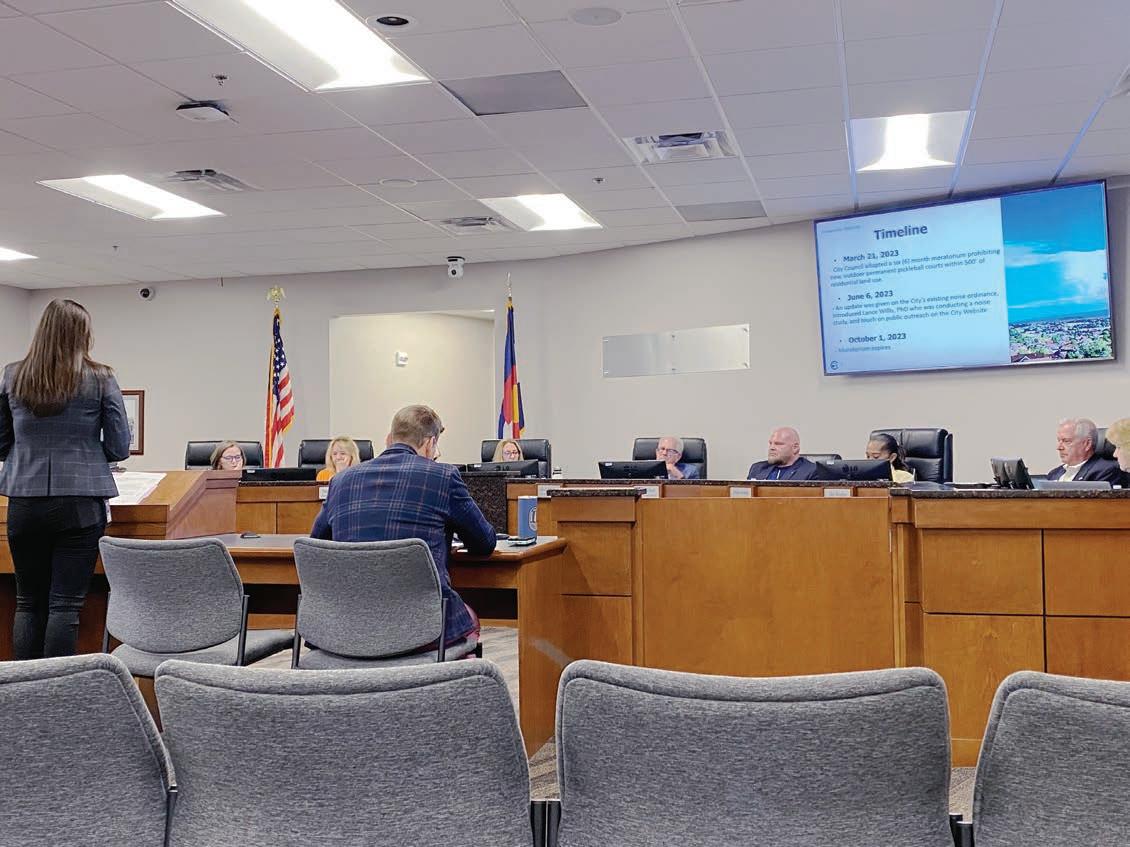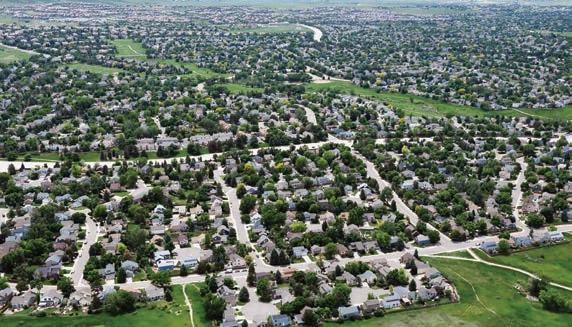
5 minute read
SCHOOLS
instructional improvement strategy, as well as one of Ewert’s most visible changes: school start times.
Ewert’s administration also saw the complete rebuilding of Newton Middle School, the opening of Ford and Gaskill elementary schools, and redrawn school boundaries.
e new schools largely served to consolidate several under enrolled schools which have closed over the years. ese include Moody, East, Highland, Franklin, Peabody, Ames, Whitman, and Twain elementary schools.
“It’s a challenge and declining enrollment is not going to stop,” Ewert said.
A new era
Lambert comes to the district from a superintendent post in Indiana, having previously worked in the Poudre School District in Fort Collins. He has 29 years of experience in education.
As for the district under the leadership of Lambert, Reichardt thinks he will “settle the change that [Ewert] has put in place.”
Lambert knows the district is at a turning point, with dropping enrollment across the Denver metro area as a result of an increasingly di cult real estate market for young families as well as a dropping birth rate in the country.
According to Lambert, district leadership will be having conversations regarding school boundary changes, as some schools are on the “edge of capacity” and others are under enrolled.
“We’re going to be making some big decisions in the next 12 to 18 months regarding how we position kids in the district and where people go to school. ose are always sensitive, di cult issues to address,” he said. “So, we want to be careful, thoughtful, and do them in a transparent way.” e core mission of the district is unchanged, as Lambert plans to continue Ewert’s work with a focus on student success.
“One hundred percent of our students are going to graduate prepared for meaningful post- secondary opportunities,” Lambert said. “ at work starts with our preschool.”
Although the goal is unchanged, these opportunities look di erent than a decade ago, and Lambert plans on positioning students for success in an “increasingly automated world.” e Explorative Pathways for Innovative Careers Campus — dubbed the EPIC Campus — has been built across the street from Littleton High School, and will o er high school students an opportunity to study professional pathways, earn high school and college credit, and receive industry certi cates.
“I would certainly want my legacy to be someone who positioned us for the future,” he said.


Ewert said the district is “behind the eight ball” when it comes to preparing students for post-secondary opportunities that do not necessarily involve going to college.
“We are really, really good at sending kids to college, but what we know now and moving forward is that college was the thing for my generation to do,” Ewert said. “You went to high school, you went to college, you got a degree. at’s not necessarily the case any longer and that’s okay.”
In addition to the district’s academic ambitions, Lambert sees necessary improvements that must be made to the buildings themselves.
“We have great facilities, but they’re not brand new,” he said.
“And as facilities get older, deferred maintenance issues that are associated costs associated with that work become very expensive.”
First and foremost, Lambert is focused on getting to know the community and the people he will be working with. He has been regularly meeting with Ewert, Reichardt, and Christensen for several months to prepare for the transition, and is planning on visiting schools this fall once classes start.
“I don’t intend to do all my work from this o ce. I plan to be out to get to know the kids, our sta , our leaders, I think it’s important that the superintendent remain visible in the schools,” Lambert said. “Brian was very visible, and I plan to continue that same tradition.”
Pandemic recovery and politics
Lambert is con dent that student academic performance will show improvement after taking an initial hit during periods of online and hybrid learning. e district is preparing to evaluate student outcomes from the 2022-23 school year, and Lambert expects that evaluation to re ect an upward trend.
“We’re starting to make those gains back, we’re starting to recover,” he said. “I think our biggest concern is more of a social-emotional impact on that work and then how that impacts academic performance.”
Another stressor of the pandemic was the intrusion of partisan politics into school districts, many of which became a political battleground as a central point of controversial COVID-19 policy.
As Ewert departs, he maintains that it is essential to keep politics out of district administration and o the board.
“It’s really, really crucial that [the board] keep partisan politics out of our school district. ey’ve done a great job so far, but it always seems to be lingering at the edges,” Ewert said.
In noting the rifts within the Jefferson County and Douglas County school districts, Ewert added, “All of those political pressures are absolutely damaging to public education. Damaging to teachers, damaging to administrators, nobody wants to work in that environment.”
As Christensen assumes the presidency of the board, she is prepared to continue the district’s tradition of separating politics from district management.
“It’s scary how quickly a board can be overturned because of partisan politics,” she said. “I really would prefer not to know where any of my colleagues sit on the political spectrum, because when we walk into that boardroom, I really hope that we leave politics at the door, and that we are there for students.”
Tough decisions
If declining enrollment is here to stay, the impact will not remain only at the elementary level, according to Ewert. Between 2012 and 2020, district enrollment declined by 9 percent overall, and 12 percent at the elementary level, district numbers show.
“We’ve closed many, many schools over the past 10 to 15 years, and now it’s going to impact middle schools and high schools as well,” Ewert said. “ e challenge will be, you know, how do you manage that without tearing up neighborhoods and communities? It’s always a volatile conversation when you have to shift boundaries or close schools.”














As for shuttering middle and high schools, Ewert said that the district is “not quite there yet.” Declining enrollment is starting to impact these schools, but as of now, “the numbers don’t quite work out” to begin school consolidation at the middle and high school level.
Right now, the district will remain focused on redrawing boundary lines to control uctuating school populations, according to Lambert.
“I don’t see us closing or doing anything like that with middle schools or high schools in the near future,” Lambert said. “I see us using the population shifts, the boundary changes as our rst course of action.” selection. ese moments never fail to make her smile.
“It brings me just a ton of joy to see people enjoying it and enjoying the space,” Monson said. “I think it’s also enriched my kids’ love and appreciation for literature because they get so excited about nishing a book and passing it on.”
Monson built her library in 2017 and registered it with Little Free Library, a Minnesota-based nonpro t that aims to increase access to literature by providing blueprints and guides to build community libraries, as well as mapping registered libraries across the country.


Hundreds of little free libraries have popped up across the Denver metro area as their popularity proliferates. Monson said she was inspired to build her library after visiting others with her 11-year-old twins Tommy and Luci, who are avid readers.
“I really believe in the importance of building community and connection for wellness, so I thought it was a great way to build community shortly after we moved to Golden,” she said. “So it was their love of reading and my want to build community that made it happen.”
Since the library is on a bike and walking path, it’s not accessible by car, so Monson took advantage of the unique environment by adding a bench, a slide and fairy gardens around the library to make it an inviting spot for visitors.









